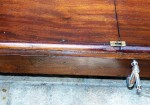(After five years working in various places as a Harvey Girl, Sophia Teague — still using another woman’s last name – arrives in Deming, New Mexico – where she encounters an old friend and makes a new one.)
Chapter 14 – Lottie
 The streets of Deming were filled with ruts, the occasional puddle and mound of horse-dung, and lined with unadorned frame and adobe-brick buildings, but at least the city fathers had lined a few of the main streets with wooden sidewalks. Ahead of them, Sophia could see a plain white-washed steeple which must mark the sanctuary of St. Luke’s. This was not anything like the spires of churches back in Boston – tall stone or brick, ornamented with carvings and iron-work, from which the chiming of bells rang out the hours and events. But this was the West, and Sophia had over the last six years become accustomed to it.
The streets of Deming were filled with ruts, the occasional puddle and mound of horse-dung, and lined with unadorned frame and adobe-brick buildings, but at least the city fathers had lined a few of the main streets with wooden sidewalks. Ahead of them, Sophia could see a plain white-washed steeple which must mark the sanctuary of St. Luke’s. This was not anything like the spires of churches back in Boston – tall stone or brick, ornamented with carvings and iron-work, from which the chiming of bells rang out the hours and events. But this was the West, and Sophia had over the last six years become accustomed to it.
“I like to look out and see mountains,” she remarked, for such mountains rose all around Deming, dark-blue, tan, or rose-colored, depending on the time of day and angle of the sun. “There were none to speak of around Newton, but there were splendid ones at La Junta. Flee as a bird to the mountain … I always liked that verse, even though there were no mountains around Boston – only hills.”
“There were hills where I was raised as a boy,” Mr. Steinmetz said, and Sophia looked sideways at him – an easy undertaking for their heads were much on the same level.
“I thought that you came from Germany,” she ventured, and he nodded.
“I did. From a little village in Bavaria that no one has ever heard anything of or likely will. But when my father and my sister Liesel’s husband decided that we should take up the offer of the Verein and come to Texas, my brother and I were only seven. My mother … it was very sad – she died on the ship coming over. You remind her a little of her, Miss Teague, or so I can remember. My father was an unworldly sort; he made clocks and read books. We finished up in the hill country of Texas, two or three days’ journey north of San Antonio. What with one thing and another, Johann and I were too much for him to handle, so Vati sent Johann and I to live with my oldest sister and her husband. They had a fine little ranch on the Guadalupe River – my sister is quite formidable, you see. Magda’s husband was born American, and he was formidable in his own way. Then Johann went back to Germany to study medicine, and I got the gold fever … but in between times, I usually came back to to live at their place. Magda’s son owns it now, and he has a family…” he grinned at her, “So, I had to finally settle on my own place.”
“Was that the cattle baron?” Sophia frowned in deep puzzlement. “The man who owned all the cattle and ranches, and the parlor car?”
“That was Hansi – Liesel’s husband. Magda’s husband Carl was murdered by the hanging band during the War. He was a Unionist, you see. A long time ago, then, but she still wears black for him … may I ask the favor of sitting with you for the services, Miss Teague? I have been so long and unremitting in my absence from such observances that I fear the roof may fall in on me, so I beg the pleasure of your company.”
“Certainly,” Sophia replied, with as demure a manner as Fee had always urged upon her. “Although … I have not always been observant, either, of late.”
“The days sometimes just run away from you,” Mr. Steinmetz observed, wryly, as they approached the church, with its brave little tower lifted up into the faultlessly blue sky. There were other churchgoers ahead of them, lingering about the door greeting arriving friends before the service began. Most were men, stiff and formal in dark town suits which they only donned once a week, but there were two or three women among them – plainly wives or daughters. Sophia was rather glad to be with Mr. Steinmetz; men so usually outnumbered women in the west, and if she had come alone to church, she would have been the focus of interest – wistful on the part of single men and censorious on the part of women, single and married alike.
“Gott in Himmel,” Mr. Steinmetz exclaimed, reverting into German in his surprise. “As I live and breathe, Lottie Deno! And with Frank Thermond too – so she married him at last! Good for them both, I say!”
“Who is Lottie Deno? Was she someone you knew in California?” Sophia assumed that he meant the handsome woman dressed in the height of fashion, standing at the church doorway. The woman had flaming red-gold hair, piled high under a fashionable hat, and she leaned on the arm of a tall man in a well-cut suit that was equally the match to her elaborate day-dress. Mr. Steinmetz grinned like a mischievous boy.
“No – San Antonio, when I used to amuse myself playing cards at the University Club; I confess, Miss Teague – it was a gambling den, but one of the honest ones – and she dealt poker there. She didn’t allow any bad language or liquor at her table, neither – the most lady-like dealer you ever laid eyes upon … that is, if you set foot in a gambling den at all, Miss Teague. Her right name is Charlotte Thomkins, but one night a cowboy with too much liquor in him looked at her pile of winnings and said, ‘Darlin’, with winnings like that, you outta call yourself Lotta Dinero,’ and after that, everyone began calling her Lottie Deno.” He looked sideways at her, and added. “She’s a good ‘un and a lady as well … but don’t ever bet money against her when she’s flipping those pasteboards. Might just as well give her your poke straight-out, and save time and trouble. I’ll tell you the one story about her that I saw with my own eyes …”
He was interrupted, by that handsome woman exclaiming, “Fred! Darlin’ Dutch! I knew you were in Deming, Frank relays to me all the suitable gossip, but I never in all my days expected to see you here!” She came down the steps toward them, a white swan among ducks, a sailing yacht among scows – all parting from her path like commoners before royalty. Her accent was Southern, as sweet and slow as honey dripping from a comb, and she embraced Mr. Steinmetz with as much affection as if she were a kinswoman.
“Lottie, my darling – you are as refreshing as a spring of cool fresh water in the desert,” He kissed her hand with gallant affection. “I had no idea you were in Deming until this moment – have you and Frank re-opened the University Club without telling me? I shall have to come and sit for a game…”
“La, you are naughty, Dutch!” Lottie struck him lightly on the arm, with mock-anger. “We have given all that up, being respectable citizens now. Frank is a banker – can you imagine?”
“He certainly banked enough of my money, over time,” Mr. Steinmetz answered, laughing and Lottie struck him – again, lightly.
“And you have not introduced me to your lady! Were you born in a barn, Dutch?”
“Close to it,” Mr. Steinmetz replied, much amused, although he covered Sophia’s hand with his own in a reassuring way. “Lottie, may I present Miss Sophia Teague – a young lady of good family from Boston who has lately arrived as an employee at the Harvey House. We are acquainted from the time that she worked at a Kansas Harvey house, and have just this moment renewed the acquaintance. Miss Teague – Mrs. Charlotte Thurmond, likewise of a family most suffocatingly respectable, but also afflicted with an equally impetuous spirit of adventure …”
“Isn’t he the naughtiest,” Lottie Thurmond replied, although her brown eyes sparkled with merriment. “How can you endure him, Miss Teague?”
“With the same composure which was my family habit,” Sophia replied, and Lottie Thurmond giggled in delight.
“Yours too, Miss Teague? We must become friends, then.” To her vague surprise, Lottie Thurmond embraced her, in a froth of sweet-smelling ruffles and lace, whispering, “The Harvey House – how tremendously exciting! I will want to hear all about it! Our little outpost of civilization in a far and desolate land … oh dear – there is the bell. Come and speak to me after the service. This is our highest social occasion of the week, you see. Attention must be paid!”
The bell in the steeple above rang once, twice and once more – the last of those latecomers catching a hasty greeting from their friends on the steps before the door recalled the purpose for which they had assembled themselves on an early morning. Sophia and Mr. Steinmetz found themselves sitting in pew, side by side.
“You said that you would tell me a true story about Mrs. Thurmond,” Sophia whispered, under the murmur of other parishioners settling themselves into their own favored pews. “It’s not improper, is it? I would hate to hear something … rude, when she has been so welcoming.”
“No, it’s not improper,” Mr. Steinmetz whispered in return. “There was this one evening at the University Club when she was dealing, and two men quarreled and drew on each other … and every man jack of us hit the floor or ducked behind the bar at the first shot. When they were done exchanging lead civilities, there was Lottie, sitting as prim and calm as you please, and she said, “Gentlemen, I came here tonight to play poker, not roll around on the floor! Cool as a cucumber, she was.” Mr. Steinmetz shook his head, obviously still in awe.
The familiar words of the service were as a balm to a troubled soul; Sophia found herself comforted, recalling as they did her happiest childhood days in Boston, sitting between Mama and Great-Aunt Minnie in the Vining family pew. Why, oh why had such happy contentment not continued on as it had? If she had married Lucian Armitage as had been intended, they would have undoubtedly been blessed by children by now. When she was a little girl, she had pretended that her dolls were children – her own family. She deeply envied Laura her children.
Sitting next to Mr. Steinmetz, sharing her prayer book with him, silently pointed out the order of service and the readings – that was a balm as well. He sang well, too – a light and pleasant tenor, although he whispered to her at the end of the service,
“Doesn’t seem right to me, being in English; back in Texas when I was a boy, our church was in German, but I always fell asleep during the sermon anyway.”
“That was very naughty of you,” Sophia replied. “What did your father say, then?”
“Nothing much – he was a free-thinker. My sisters would pinch me, though. I always thought it was just because I was a boy and Pastor Altmueller’s sermons bored me. Then I grew up … and he was still boring. He’d say five sentences together, and I’d start to snore.”
“Sermons are supposed to be improving to one’s character,” Sophia reproved him.
“I always wondered about that,” he admitted. “But as I said – I think my brother Johann got most of the brains intended for the pair of us. You should be warned, Miss Teague – I believe that Lottie is waiting for you by the door.”
So she was; as soon as Sophia and Mr. Steinmetz approached, Lottie Thurmond exclaimed, “Miss Teague, Fred – you simply must join us for Sunday dinner – I must insist on it. Frank wishes to catch up on old times, and I am perishing for lack of stimulating conversation … if I listen to one more conversation between two females comparing their children’s clevernesses, and recipes for jam, I vow to you that I will scream … say that you will indulge me, Miss Teague. We will talk about books, or the diseases plaguing cattle, the difficulties in digging wells in this country, or Indian depredations, and you may tell me all about your adventures … whatever you wish.”
“Why … yes, certainly,” Sophia replied, charmed and slightly overwhelmed by the intensity of Lottie Thurmond’s interest.
“Splendid! Frank is bringing around the buggy – although it is a short way to our house, we could almost walk, but the day becomes so warm … Fred, you are building a new house, are you not?”
“Yes, ma’am, I will be doing that,” Mr. Steinmetz explained. “As soon as the wells are dug; can’t have the cattle dying of thirst, you know.”
Swept along in Lottie Thurmond’s enthusiasm and Mr. Steinmetz’ friendly interest, Sophia spent the remainder of the day most enjoyably – much more so than she had expected. The ghastly story in the New York newspaper – which still had the power to horrify – somehow did not seem to matter to her quite as much as it had when she first read of it. Boston and the events surrounding her departure from it seemed again to have receded back into the past. Late in the afternoon, Mr. Steinmetz walked with her back to the railroad station and the Harvey house, replete with good food, and an afternoon spent in the Thurmond’s congenial company.







Recent Comments